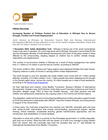Click to expand Image
China’s President Xi Jinping (R) and Japan’s Prime Minister Fumio Kishida meeting in Bangkok, Thailand, November 17, 2022.
© 2022 Pool for Yomiuri/AP Photo
On December 5, Japan’s upper house of parliament, the House of Councilors, approved a resolution highlighting human rights abuses in areas including Xinjiang, Tibet, Inner Mongolia, and Hong Kong. The resolution did not name China, but effectively urged the Chinese government to “explain” the “serious human rights situation” in a “convincing manner” to the international community. It also urged the Japanese government to monitor “serious human rights situations in cooperation with the international community,” and implement “comprehensive relief measures.”
While the new resolution is nearly identical to one passed by the House of Representatives, the lower house, in February, it nonetheless illustrates Japan’s increasingly firm stance on Chinese government abuses. Last year, Tokyo signed on to statements with dozens of other governments condemning Beijing’s rights violations, and earlier this year refrained from sending senior government officials to the Beijing 2022 Winter Olympics.
In October, Japan voted at the United Nations Human Rights Council in favor of a resolution calling for a debate on an August report from the UN Office of the High Commissioner for Human Rights, which detailed possible crimes against humanity targeting Uyghurs and other Turkic minorities. That effort fell short by only two votes. In November, Japanese Prime Minister Fumio Kishida “reiterated” Japan’s position on human rights during a bilateral meeting with Chinese President Xi Jinping.
The Japanese government’s continued efforts to highlight Chinese government abuses is a significant development and consistent with Tokyo’s pledge of human rights diplomacy. But Tokyo can do more. It should urge UN High Commissioner for Human Rights Volker Türk to continue monitoring and reporting to the Human Rights Council on the rights situation in China, including implementation of the high commissioner report’s recommendations, and play a role in other efforts to ensure the UN human rights system is not undermined by Beijing.
Japan should also offer greater support to refugees and asylum seekers fleeing Beijing’s persecution. These steps would demonstrate a significant change in Japan’s policy towards human rights globally, and particularly with respect to a powerful neighbor.



